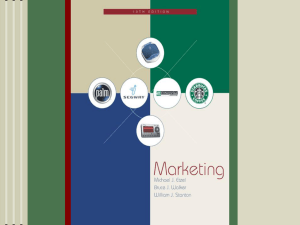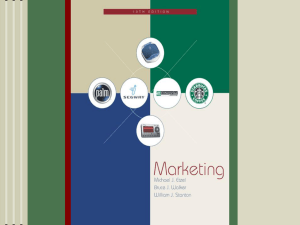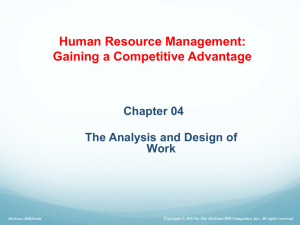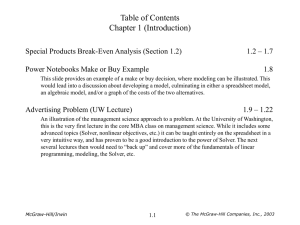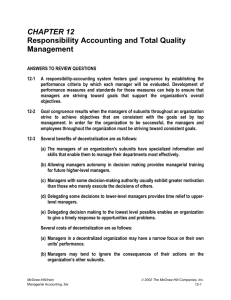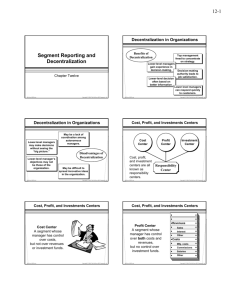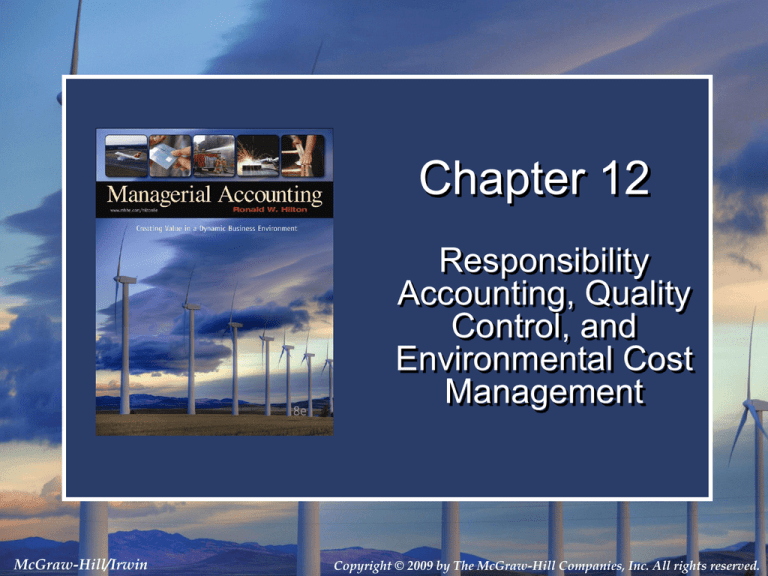
Chapter 12
Responsibility
Accounting, Quality
Control, and
Environmental Cost
Management
McGraw-Hill/Irwin
Copyright © 2009 by The McGraw-Hill Companies, Inc. All rights reserved.
Learning
Objective
1
McGraw-Hill/Irwin
Copyright © 2009 by The McGraw-Hill Companies, Inc. All rights reserved.
Responsibility Accounting
Responsibility accounting is used to measure
the performance of people and departments
to foster goal congruence.
12-3
Learning
Objective
2
McGraw-Hill/Irwin
Copyright © 2009 by The McGraw-Hill Companies, Inc. All rights reserved.
Responsibility Centers
A subunit in an organization whose
manager is held accountable for
specified financial results.
12-5
Responsibility Centers
Cost Center
Segment has
control over
the incurrence
of costs.
The Paint Department
in an automobile plant.
Revenue Center
Segment
is responsible
for the revenue of
a unit.
The Reservations
Department of an airline.
12-6
Responsibility Centers
Profit Center
Segment has
control over
both costs and
revenues.
Company-owned restaurant
in a fast-food chain.
Investment Center
Segment has
control over profits
and invested
capital.
A division of a
large corporation.
12-7
Learning
Objective
3
McGraw-Hill/Irwin
Copyright © 2009 by The McGraw-Hill Companies, Inc. All rights reserved.
Performance Reports
Show the budgeted and actual
amounts, and the variances
between these amounts, of key
financial results appropriate for
the type of responsibility center.
12-9
Performance Reports
Flexible Budget*
February
Year to Date
Company . . . . . . . . . . . . . . . . . . . . . .
Maui Division . . . . . . . . . . . . . . . . . .
Oahu Division . . . . . . . . . . . . . . . . . .
Total profit . . . . . . . . . . . . . . . . . . . .
Oahu Division
Waimea Beach Resort . . . . . . . . . . .
Diamond Head Lodge. . . . . . . . . . .
Waikiki Sands Hotel . . . . . . . . . . . . .
Total profit . . . . . . . . . . . . . . . . . . . .
Waikiki Sands Hotel
Grounds and Maintenance . . . . . . . .
Housekeeping and Custodial . . . . . .
Recreational Services . . . . . . . . . . . .
Hospitality . . . . . . . . . . . . . . . . . . . .
Food and Beverage . . . . . . . . . . . . .
Total profit . . . . . . . . . . . . . . . . . . . .
Food and Beverage Department
Banquets and Catering . . . . . . . . . . .
Restaurants . . . . . . . . . . . . . . . . . . .
Kitchen. . . . . . . . . . . . . . . . . . . . . . .
Total profit . . . . . . . . . . . . . . . . . . . .
Kitchen
Kitchen staff wages . . . . . . . . . . . . .
Food . . . . . . . . . . . . . . . . . . . . . . . .
Paper products. . . . . . . . . . . . . . . . .
Variable overhead. . . . . . . . . . . . . . .
Fixed overhead. . . . . . . . . . . . . . . . .
Total expense . . . . . . . . . . . . . . . . . .
Actual Results*
February
Year to Date
Variance†
February Year to Date
$30,660
$18,400
12,260
$30,660
$64,567
$38,620
25,947
$64,567
$30,716
$18,470
12,246
$30,716
$64,570
$38,630
25,940
$64,570
$56 F
$70 F
14 U
$56 F
$3F
$10 F
7U
$3F
$6,050
2,100
4,110
$12,260
$12,700
4,500
8,747
$25,947
$6,060
2,050
4,136
$12,246
$12,740
4,430
8,770
$25,940
$10 F
50 U
26 F
$14 U
$40 F
70 U
23 F
$7U
($45)
(40)
40
2,800
1,355
$4,110
($90)
(90)
85
6,000
2,842
$8,747
($44)
(41)
41
2,840
1,340
$4,136
($90)
(90)
88
6,030
2,832
$8,770
$1F
1U
1F
40 F
15 F
$26 F
—
—
$3F
30 F
10 U
$23 F
$600
1,785
(1,030)
$1,355
$1,260
3,750
(2,168)
$2,842
$605
1,760
(1,025)
$1,340
$1,265
3,740
(2,173)
$2,832
$5F
25 U
5F
$15 U
$5F
10 U
5U
$10 U
($80)
(675)
(120)
(70)
(85)
($1,030)
($168)
(1,420)
(250)
(150)
(180)
($2,168)
($78)
(678)
(115)
(71)
(83)
($1,025)
($169)
(1,421)
(248)
(154)
(181)
($2,173)
$2F
3U
5F
1U
2F
$5F
$1U
1U
2F
4U
1U
$5U
*Numbers w ithout parentheses denote profit; numbers w ith parentheses denote ex penses; numbers in thousands.
†F denotes fav orable v ariance; U denotes unfav orable v ariance.
12-10
Learning
Objective
4
McGraw-Hill/Irwin
Copyright © 2009 by The McGraw-Hill Companies, Inc. All rights reserved.
Cost Allocation
The process of assigning the costs in the cost pool
to the cost objects is called cost allocation or cost
distribution.
12-12
Cost Allocation Bases
An allocation base is
a measure of activity,
physical
characteristic, or
economic
characteristic that is
associated with the
responsibility centers,
which are the cost
objects in the
allocation process.
12-13
Activity-Based Responsibility
Accounting
Traditional responsibility-accounting systems tend to
focus on the financial performance measures of cost,
revenue, and profit for subunits of the organization.
Activity-based costing systems associate costs
with the activities that drive those costs. In activitybased responsibility accounting attention is
directed not only to costs incurred but also to the
activity creating the cost.
12-14
Behavioral Effects of
Responsibility Accounting
Controllability
Information
versus
Blame
Motivating
Desired
Behavior
12-15
Learning
Objective
5
McGraw-Hill/Irwin
Copyright © 2009 by The McGraw-Hill Companies, Inc. All rights reserved.
Segmented Reporting
A segment is any part or
activity of an organization
about which a manager seeks
cost, revenue, or profit data.
Segmented reporting refers to
the preparation of accounting
reports by segment and for the
organization as a whole.
12-17
Segmented Reporting
Aloha Hotels and
Resorts
Maui Division
Waimea Beach
Resort
Divisions
•
Oahu Division
Diamond Head
Lodge
Waikiki Sands Hotel
•
Units
12-18
Segmented Reporting
12-19
Key Features of Segmented
Reporting
Contribution format.
Controllable versus uncontrollable expenses.
Segmented income statement.
12-20
Customer Profitability Analysis
and Activity-Based Costing
Let’s see, I need . . .
Special credit terms,
Small order lots,
Special packing,
Great field service,
and JIT delivery.
Customer
We can handle
that - but we need
to quote a price that
reflects the value
of these services.
Company
Sales Rep
12-21
Learning
Objective
6
McGraw-Hill/Irwin
Copyright © 2009 by The McGraw-Hill Companies, Inc. All rights reserved.
Total Quality Management
Design
Grade
Conformance
Quality
12-23
Cost of Quality
Quality costs include the follows:
– Prevention costs,
– Appraisal costs,
– Internal failure costs, and
– External failure costs.
12-24
Cost of Quality
The opportunity
cost of lost
sales and
decreased
market share
can represent a
significant
hidden cost.
12-25
Learning
Objective
7
McGraw-Hill/Irwin
Copyright © 2009 by The McGraw-Hill Companies, Inc. All rights reserved.
Changing Views of Optimal
Product Quality
Costs
Traditional View
Total
quality
costs
Failure costs
Prevention and
appraisal costs
0%
100%
Percentage
of defective
products
Minimum
12-27
Changing Views of Optimal
Product Quality
Costs
Contemporary View
Total
quality
costs
Failure costs
Prevention and
appraisal costs
0%
100%
Percentage
of defective
products
Minimum
12-28
Identifying Quality Control Problems
150
140
130
Poor reception/
static on line
Pareto Diagram
120
110
100
90
80
70
Too easily
moves out of
transmission
range
60
50
40
30
Power
declines too
rapidly
Faulty casing
(easily broken)
20
10
0
Type of product defect
12-29
ISO 9000 Standards
The International Standards Organization (ISO),
require that a manufacturer have a well-defined
quality control system in place, and that the target
level of product quality be maintained.
Sustain quality of product.
Effective quality control system in place.
Provide purchaser confidence in the product.
12-30
Learning
Objective
8
McGraw-Hill/Irwin
Copyright © 2009 by The McGraw-Hill Companies, Inc. All rights reserved.
Environmental Cost Management
Private environmental
costs are assumed by
a company.
Social environmental
costs are assumed by
the public.
12-32
Environmental Cost Management
Visible private environmental
costs are measurable and
clearly identified
environmental issues.
Hidden private
environmental costs are
caused by
environmental issues
but have not been so
identified by the
accounting system.
12-33
Environmental Cost Strategies
End-of-pipe
Process
improvement
Prevention
12-34
End of Chapter 12
12-35




